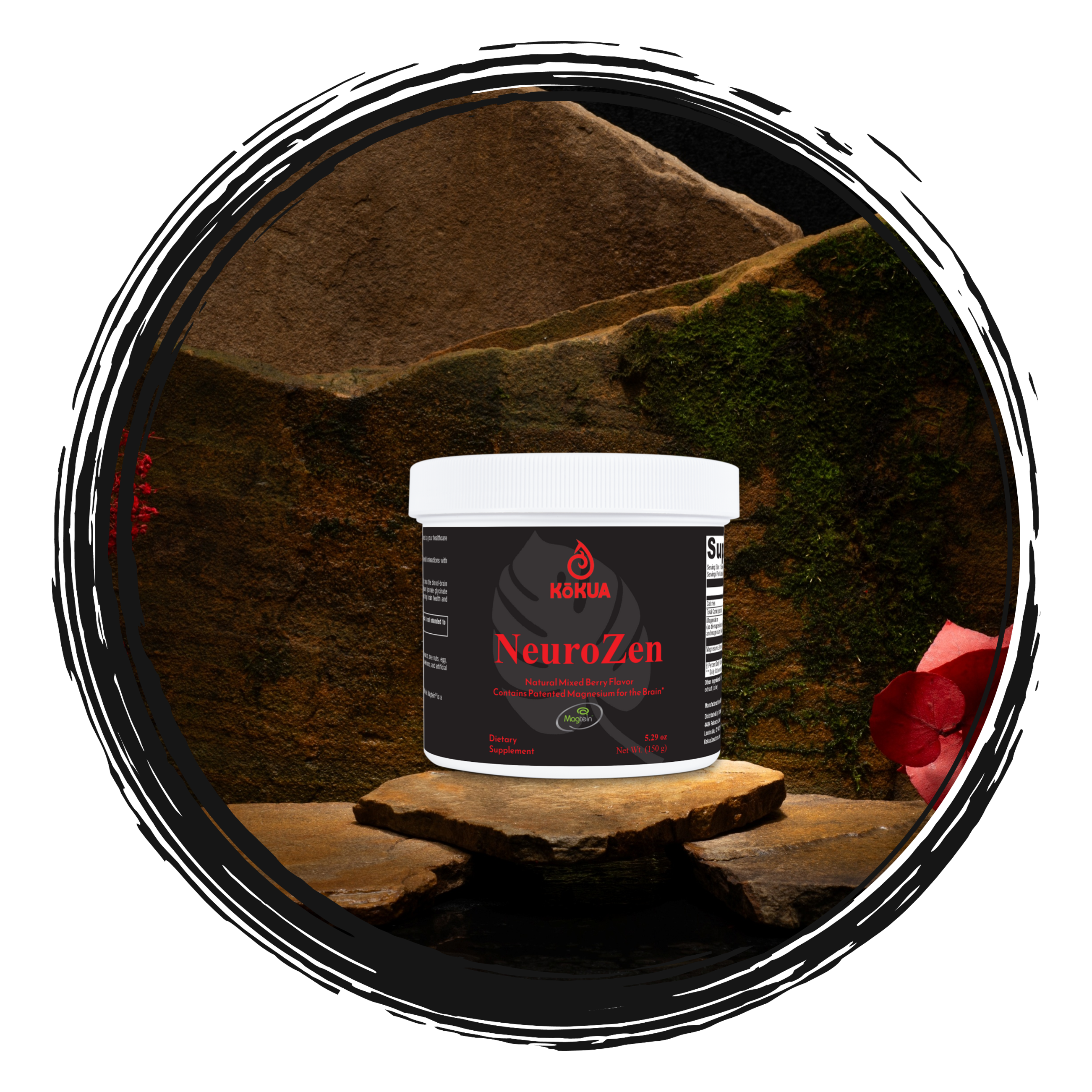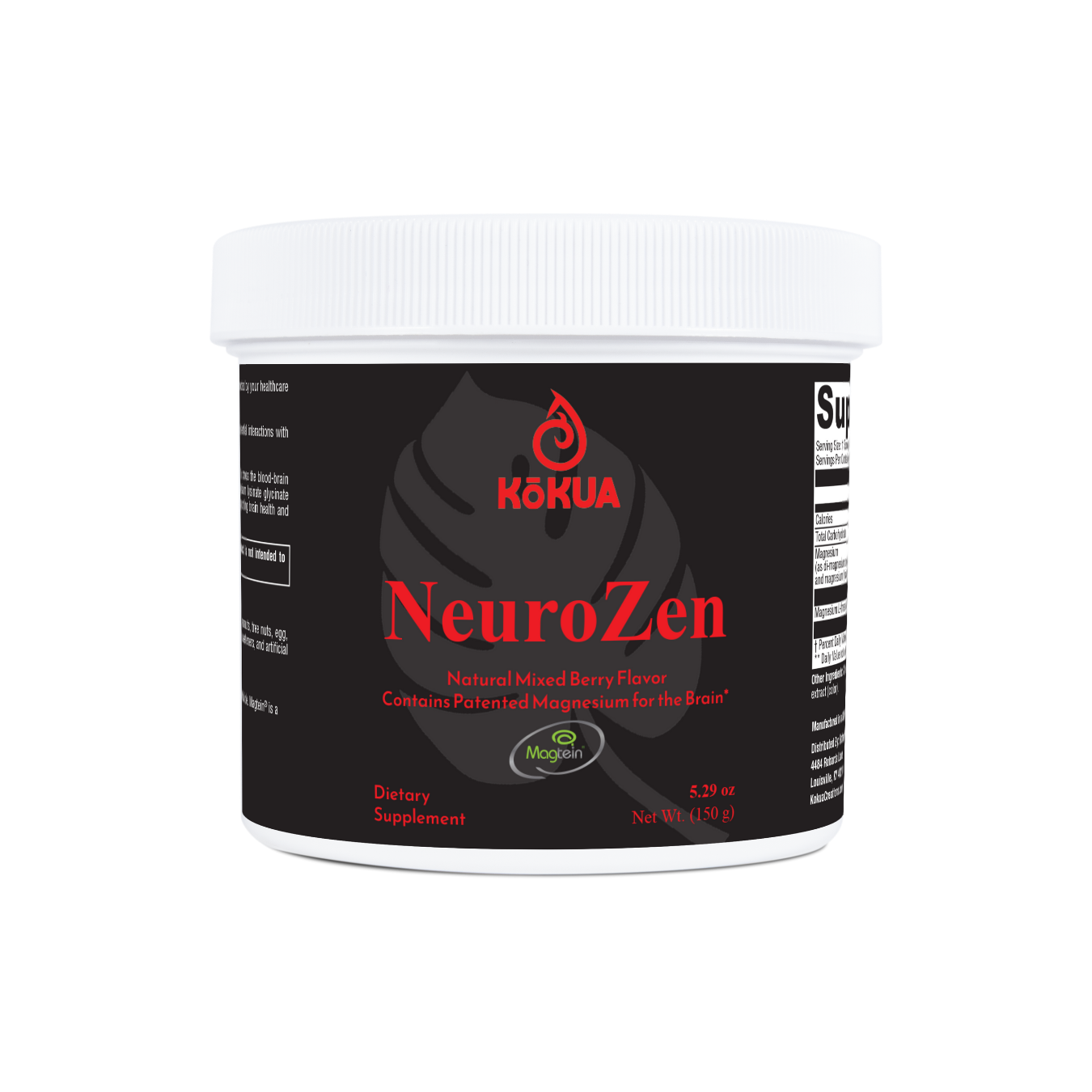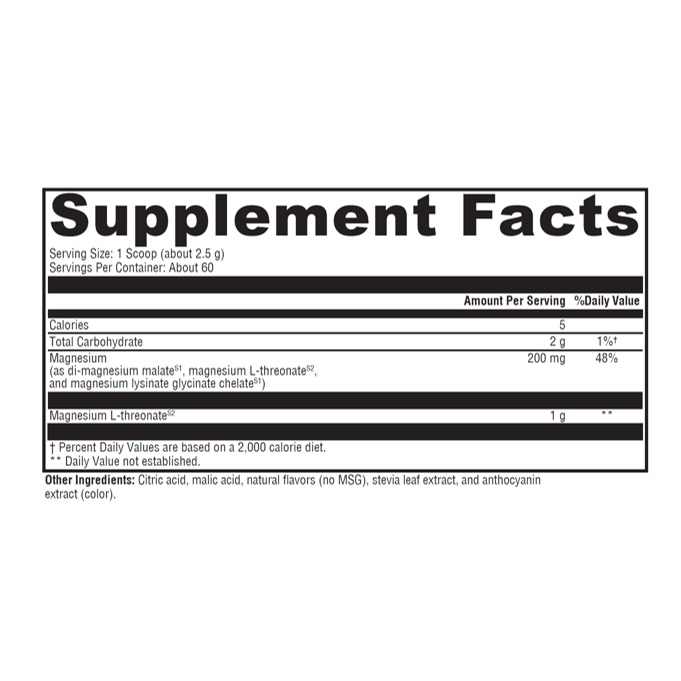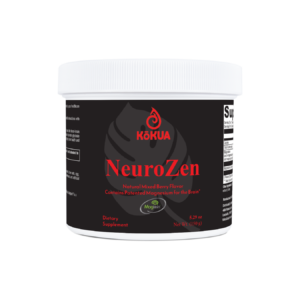
Ashwagandha

Turmeric

Vanilla Bean

Lemon Balm

Bergamot

Ashwagandha

Turmeric

Vanilla Bean

Lemon Balm

Bergamot
Optimized Magnesium.
Magnesium has numerous critical roles in human physiology, and its intake is imperative for supporting overall health. It is a cofactor in more than 300 enzymatic reactions that regulate essential functions, including energy production, blood pressure, blood glucose, bone development, and muscle and nerve function. NeuroZen features di-magnesium malate, magnesium lysinate glycinate chelate, and magnesium L-threonate, a unique combination of magnesium formulated for enhanced bioavailability to support brain health and promote healthy nervous system functions. This formula is conveniently available in mixed berry-flavored powder drink mix.
- Elevates Healthy Magnesium Levels for More Than 300 Metabolic Processes in the Body
- Assists Healthy Synapse Function
- Supports Cognitive Health
- Supports Stress Management, Sleep Quality, and a Healthy Mood
Dissolve one level scoop in 4 oz water and consume
once or twice daily, or use as directed by your
healthcare professional.
Consult your healthcare professional prior to use.
Individuals taking medication should discuss
potential interactions with their healthcare
professional. Do not use if tamper seal is damaged.
Active ingredients:
- Magtein® (Patented Magnesium L-Threonate)
- Magnesium Lysinate Glycinate Chelate
- Di-Magnesium Malate
Other ingredients: Citric acid, malic acid, natural flavors (no MSG), stevia leaf extract, and anthocyanin extract (color).
Consult your healthcare professional prior to use. Individuals taking medication should discuss potential interactions with their healthcare professional. Do not use if tamper seal is damaged.
Before use, consult with your healthcare provider if you are nursing or pregnant, have any known allergies or medical conditions, or are taking any medication.
Keep closed in a cool, dry place out of reach of children.

Deep-Dive into Ease
Cannabinoids
Cannabinoids are molecules found in the hemp flower offering functional support by interacting with the cannabinoid receptors of our body’s endocannabinoid system. CBD and CBG are known to promote relaxation, ease tension, and combat inflammation.
Ashwagandha
A powerful adaptogen known to assist the body’s ability to manage stress, ashwagandha is considered a grounding and nourishing herb, supportive to overall well-being.
Botanicals
The essence of functional botanicals infused with organic MCT oil to support rest and restoration. Ease features essential oils of turmeric, lemon balm, lemongrass, sweet orange, and bergamot.
Ingredients
Click on an Ingredient to learn more.
GABA
Gamma-aminobutyric acid (GABA) is a key inhibitory neurotransmitter in the brain that promotes relaxation, reduces stress, and improves sleep by calming neural activity. It helps alleviate anxiety, lowers stress hormones, and may enhance mood by balancing neurotransmitter levels. GABA also supports cognitive function, reduces muscle tension, and may aid in managing conditions like epilepsy and high blood pressure. Some studies suggest it could improve immunity and gut health. While the body produces GABA naturally, supplements or GABA-rich foods (like fermented products) may provide additional benefits.
Inositol
Inositol, a naturally occurring carbohydrate-like compound, offers multiple health benefits, particularly for mental and metabolic health. Often referred to as vitamin B8, it plays a key role in cell signaling and insulin sensitivity, making it beneficial for managing PCOS, reducing insulin resistance, and improving fertility. Inositol also supports mental well-being by alleviating symptoms of anxiety, depression, and panic disorders, as it influences serotonin and dopamine activity. Additionally, it may aid in reducing binge eating and promoting healthy sleep patterns. Found in foods like fruits, beans, and grains, inositol is also available as a supplement (commonly myo-inositol or D-chiro-inositol) for targeted therapeutic effects. Its calming and metabolic benefits make it a versatile nutrient for overall wellness.
L-theanine
L-Theanine, an amino acid primarily found in tea leaves, offers multiple benefits for mental and physical well-being. It promotes relaxation without drowsiness by increasing alpha brain waves, which enhance calm focus and reduce stress. L-Theanine also helps lower anxiety, improves sleep quality, and supports cognitive function by boosting attention, memory, and reaction time. Additionally, it may enhance the effects of caffeine when combined, providing a balanced energy boost without jitters. Some research suggests it could strengthen immunity, lower blood pressure, and provide neuroprotective benefits. Naturally present in green and black tea, L-Theanine is also available as a supplement for those seeking its calming and cognitive-enhancing effects.
Taurine
Taurine is a sulfur-containing amino acid that plays a vital role in various bodily functions. It supports cardiovascular health by regulating blood pressure, improving heart function, and reducing the risk of heart disease. Taurine also enhances exercise performance by reducing muscle fatigue, increasing endurance, and aiding in recovery. It supports brain health by acting as a neuroprotective agent, improving cognitive function, and potentially reducing anxiety and depression. Additionally, taurine helps regulate blood sugar levels, promotes healthy vision, and supports liver and kidney function. Found naturally in meat, fish, and dairy, taurine is also a common ingredient in energy drinks and supplements, making it beneficial for overall health and wellness.
Magnesium
Magnesium is an essential mineral involved in over 300 biochemical reactions in the body, making it crucial for overall health. It supports muscle and nerve function, helping to reduce cramps, spasms, and restless leg syndrome. Magnesium also promotes relaxation by regulating neurotransmitters, improving sleep quality, and reducing stress and anxiety. It plays a key role in heart health by maintaining normal blood pressure and supporting cardiovascular function. Additionally, magnesium aids in energy production, bone strength, and blood sugar regulation. Some studies suggest it may help with migraines, depression, and PMS symptoms. Found in foods like leafy greens, nuts, and whole grains, magnesium is also available as a supplement to address deficiencies and enhance well-being.
Deep-Dive into NeuroZen Magnesium
Magnesium has numerous critical roles in human physiology, and its intake is imperative for supporting overall health. It is a cofactor in more than 300 enzymatic reactions that regulate essential functions, including energy production, blood pressure, blood glucose, bone development, and muscle and nerve function. Magnesium is widely available in foods such as whole grains, nuts and seeds, legumes, and green leafy vegetables.1 In the United States, dietary surveys show magnesium intake is consistently below age-specific minimum recommended levels. An analysis of data from the National Health and Nutrition Examination Survey (NHANES) found that nearly half of Americans ingest less magnesium from food and beverages than is recommended.2 Insufficient intake of magnesium is implicated in a wide range of health concerns, including those that affect the brain and nervous system.*1
Supplemental magnesium can help ensure optimal intake, yet absorption pathways vary among the different forms, and some types can cause gastrointestinal (GI) distress in those with impaired digestion. Factors affecting absorption, tolerance, and retention of supplemental magnesium include the status of magnesium stores in the body and the type or form of magnesium ingested.*3
- Supports Healthy Brain Magnesium Levels
- Supports Healthy Synapse Number and Function
- Supports Cognitive Health
- Supports Stress Management, Sleep Quality, and a Healthy Mood
- Helps Ensure an Optimal Magnesium Intake for Overall Health
More than 10 years of research at MIT went into developing Magtein, a magnesium compound comprised of magnesium and threonic acid commonly known as magnesium L-threonate. Magnesium L-threonate has been suggested to be more bioavailable than other sources of magnesium and has been studied for its unique ability to cross the blood–brain barrier delivering magnesium to brain cells.*4-6
Amino acids are used as chelating agents for magnesium to enhance bioavailability, stability, and safety. Chelates increase mineral bioavailability, protect magnesium from being bound in the GI tract, and lower the risk for osmotic diarrhea, which can occur in some forms.3
As an example of the increased bioavailability and tolerability of chelated minerals, the effect of magnesium diglycinate—a chelated form of magnesium bound to 2 glycine molecules—was assessed in subjects (N = 12) with ileal resections. Data from the results suggested that this form of chelated magnesium is likely absorbed intact via a dipeptide transport pathway in different areas of the gut than magnesium oxide, rendering it potentially more bioavailable in addition to being more suitable for those with intestinal resections.7 Another study evaluating magnesium absorbability in healthy human subjects (N = 50) demonstrated that magnesium amino acid chelate had better short-term (24 hours) and long-term (60 days) absorbability when compared with magnesium oxide, but the results were not statistically significant.*8
Magnesium lysinate glycinate chelate is a mineral amino acid chelate in which magnesium is bound to the amino acids lysine and glycine to create a complex that is readily absorbed across the intestinal wall like other chelated forms.*
This form of magnesium contains malic acid, which also forms a complex with magnesium. In a scientific opinion paper, the European Food Safety Authority (EFSA) cited an unpublished, randomized trial in healthy volunteers (N = 14) in which the bioavailability and tolerability of 150 mg of magnesium from bisglycinate chelate, buffered bisglycinate chelate, and di-magnesium malate were found to be significantly higher than magnesium oxide.9 In an animal study, 5 magnesium preparations were evaluated by examining time-dependent absorption, tissue penetration, and effect on the behavior of the animals. Pharmacokinetically, the area under the curve calculation was highest for magnesium malate, suggesting enhanced bioavailability. Further research is needed in humans to assess the dose and effects of dimagnesium bound to malate on specific tissues and behavior.*10
Magnesium has been suggested to play a role in promoting synaptic plasticity in the brain, helping brain cells respond to signals with clarity and vigor without being overactivated. Cognitive decline has been linked to loss of synapse functionality*.11
Ingesting conventional magnesium compounds does not appear to elevate brain magnesium. However, animal studies have shown that magnesium L-threonate crosses the blood–brain barrier, resulting in increased magnesium in extracellular fluid and deposits in neural synapses, increased neural synaptic density, and improved cognitive function.4,12-14 Results from a study in rodents suggested that L-threonate is the only ligand to efficiently transport magnesium into cerebrospinal fluid and then into neurons.6 To gain a deeper understanding of the mechanisms involved, animal research also found that magnesium L-threonate increased receptor signaling, specifically, the signaling of the NR2B-containing N-methyl-D-aspartate (NMDA) receptor. These NMDA receptors are rich in the hippocampus and play a pivotal role in memory processes.4 Several preclinical animal studies that used assessments, such as the novel object recognition test (NORT), T-maze, Morris water maze, conditioned fear memory, and conditioned taste aversion, have validated the effectiveness of magnesium L-threonate in animals. In these studies, researchers demonstrated that when brain magnesium levels were increased, significant benefits were detected in multiple aspects of learning and memory in young and aged rodents.*13-15
The effects of magnesium L-threonate have also been studied in human trials. In a randomized, double-blind, placebo-controlled trial, a magnesium L-threonate complex significantly affected human cognition in subjects (N = 51) aged 50 to 70 years with self-reported memory, concentration, anxiety, and sleep issues. Participants administered 1.5 to 2 grams of
magnesium L-threonate complex daily for 12 weeks demonstrated reduced cognitive declines compared with age-matched controls. Furthermore, using normative TMT-B data from age-matched subjects, the researchers calculated a particularly compelling impact of magnesium L-threonate; after 6 weeks of treatment, the average brain age decreased from 69.6 ± 4.2
years to 60.6 ± 5.6 years, an improvement of 9.0 ± 3.5 years, and persisted after 12 weeks of treatment with 9.4 ± 3.5 years of improvement. In addition, it should be noted that the complex used in this study contained vitamins C, D, and B6, which could contribute to the beneficial effects attributed to magnesium L-threonate.*16
In the largest human trial to date investigating the cognitive effect of magnesium L-threonate in healthy adults aged 19 to 65 years, subjects (N = 109) were randomly assigned to receive placebo or 1600 mg of a magnesium L-threonate combined with low levels of vitamin D, C, B6, and phosphatidylserine. Using a standard test for cognitive evaluation, subjects in the test group showed significant improvements in average scores for 5 key measures of learning, recall, and memory, with more improvement noted for all parameters in older participants.*5 Although human trials have suggested an efficacious role for compounds containing magnesium L-threonate in supporting cognitive health, additional randomized, placebo-controlled trials in larger groups of healthy individuals are needed to further clarify the optimal dose and benefits attributed to magnesium L-threonate alone.*
Because of its role in brain chemistry, magnesium is also known to benefit the body in ways that may counter stress, promote restful sleep, and support a healthy mood.17-19 In animal studies, magnesium administration has been shown to attenuate neurologic changes brought on by chronic mild stress.19
Experiments with magnesium L-threonate have shown promise for its use as a modulator of worry by increasing fear memory extinction and inhibiting fear overgeneralization.*14,19 In humans, analysis of case histories in magnesium-deficient individuals has helped researchers hypothesize magnesium’s role in mood improvement.17
Studies have suggested that magnesium supplementation may positively affect endocrine-related sleep changes associated with aging20 and improve objective and subjective measures of sleep.21-24 Further investigations are needed to confirm the role of supplemental magnesium and the dose needed to counter stress, promote restful sleep, and support a healthy mood.*
References
1. Magnesium fact sheet. National Institutes of Health. Updated June 2, 2022.
Accessed October 13, 2023. https://ods.od.nih.gov/factsheets/Magnesium-HealthProfessional/
2. Usual nutrient intake from food and beverages, by gender and age, what we eat in America,
NHANES 2013-2016. USDA, Agricultural Research Service. 2019. Accessed https://www.ars.usda.
gov/ARSUserFiles/80400530/pdf/usual/Usual_Intake_gender_WWEIA_2013_2016.pdf
3. Siebrecht S. Int J Orthomol Relat Med 2013;144:1-6.
4. Slutsky I, Abumaria N, Wu LJ, et al. Neuron. 2010;65(2):165-177. doi:10.1016/j.
neuron.2009.12.026
5. Zhang C, Hu Q, Li S, et al. Nutrients. 2022;14(24):5235. doi:10.3390/nu14245235
6. Sun Q, Weinger JG, Mao F, et al. Neuropharmacology. 2016;108:426-439. doi:10.1016/j.
neuropharm.2016.05.006
7. Schuette SA, Lashner BA, Janghorbani M. JPEN J Parenter Enteral Nutr. 1994;18(5):430-435.
doi:10.1177/0148607194018005430
8. Walker AF, Marakis G, Christie S, et al. Magnes Res. 2003;16(3):183-191.
9. EFSA Panel on Food Additives and Nutrient Sources added to Food (ANS); Younes M, Aggett P,
et al. EFSA J. 2018;16(6):e05292. doi:10.2903/j.efsa.2018.5292
10. Uysal N, Kizildag S, Yuce Z, et al. Biol Trace Elem Res. 2019;187(1):128-136. doi:10.1007/
s12011-018-1351-9
11. Andrási E, Páli N, Molnár Z, et al. J Alzheimers Dis. 2005;7(4):273-284. doi:10.3233/jad-2005-
7402
12. Slutsky I, Sadeghpour S, Li B, et al. Neuron. 2004;44(5):835-849. doi:10.1016/j.
neuron.2004.11.013
13. Li W, Yu J, Liu Y, et al. Mol Brain. 2014;7:65. doi:10.1186/s13041-014-0065-y
14. Abumaria N, Yin B, Zhang L, et al. J Neurosci. 2011;31(42):14871-14881. doi:10.1523/
JNEUROSCI.3782-11.2011
15. Mickley GA, Hoxha N, Luchsinger JL, et al. Pharmacol Biochem Behav. 2013;106:16-26.
doi:10.1016/j.pbb.2013.02.019
16. Liu G, Weinger JG, Lu ZL, et al. J Alzheimers Dis. 2016;49(4):971-990. doi:10.3233/JAD-150538
17. Eby GA, Eby KL. Med Hypotheses. 2006;67(2):362-370. doi:10.1016/j.mehy.2006.01.047
18. Pochwat B, Szewczyk B, Sowa-Kucma M, et al. Int J Neuropsychopharmacol. 2014;17(3):393-
405. doi:10.1017/S1461145713001089
19. Abumaria N, Luo L, Ahn M, et al. Behav Pharmacol. 2013;24(4):255-263. doi:10.1097/
FBP.0b013e32836357c7
20. Held K, Antonijevic IA, Künzel H, et al. Pharmacopsychiatry. 2002 Jul;35(4):135-143.
doi:10.1055/s-2002-33195
21. Abbasi B, Kimiagar M, Sadeghniiat K, et al. J Res Med Sci. 2012;17(12):1161-1169
22. Hornyak M, Voderholzer U, Hohagen F, et al. Sleep. 1998;21(5):501-505. doi:10.1093/
sleep/21.5.501
23. Nielsen FH, Johnson LK, Zeng H. Magnes Res. 2010;23(4):158-68. doi:10.1684/mrh.2010.0220
24. Saba S, Faizi F, Sepandi M, et al. Magnes Res. 2022;35(2):62-70. doi:10.1684/mrh.2022.0503

How To Use
1. Shake well before use.
2. Administer sublingually by dispensing Ease Drops under the tongue.
3. Hold for at least 60 seconds.
4. Swallow and enjoy daily support for focus, clarity, mood support, sleep, relaxation and recovery.
Consistency is key to support overall health, and the benefits of Ease Drops compound with cumulative use. Some may experience immediate effects, while others can take up to 30 days of consistent use. Individual results may vary. Ingest up to two times per day.
With growing evidence of cannabinoids’ neuroprotective properties, Ease is an essential addition to a proactive health approach.





Reviews
There are no reviews yet